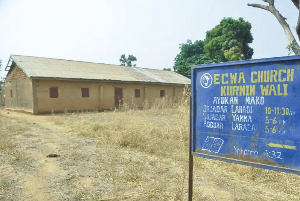Dr Ephraim Avea Nsoh, the Upper East Regional Minister, said on Friday that the government was committed to ensuring that local industries thrive even in the face of liberalisation of the economy.
He said as much as the government cannot totally ban imports of competitive goods and services, it would promote the use of made in Ghana goods and protect other local industries such as the textile industry to ensure that they survived the market pressures.
The Regional Minister said this in Bolgatanga at a sensitization workshop for textile dealers and the general public. He said revamping of the cotton industry in the Garu-Tempane District in the Region under a programme dubbed “White Gold” was a clear indication that the government was more committed to that sector.
“It was because of the potential cotton has in promoting the textile industry and creating jobs in the country that Government in conjunction with WIENCO launched the Project”, he added.
Dr Nsoh expressed regret at the increasing importation of pirated Ghanaian textiles in spite of frantic efforts being made by the government to promote the textile industry and made in Ghana goods and said it was an unhealthy practice perpetuated by some Ghanaian traders.
He said in the 1960s, the textile industry contributed significantly to the manufacturing sector by offering employment to over 30,000 workers but currently the textile manufacturing industries put together employed less than 3,000 workers.
“This is a worry to Government as a number of companies in the textile and garment sub- sector are closing down and laying off their staff”, the Regional Minister said.
The Chairman of Tax Force on Seizure and Disposal of Pirated Ghanaian Textile Designs, Mr Appiah Donyina, said from next month, members of the Task Force with the assistance of the security agencies would descend on traders who stock and sell Ghanaian pirated goods.
Mr Eugene Adarkwa Addai, an official from the Ghana Standards Authority expressed regret that Ghanaians imported counterfeit textiles into the country and embossed them with imitated Ghanaian logos to make them look like made in Ghana textiles.
He described such activities as not only criminal but dangerous to the health of consumers because most the chemicals used to treat such fake textiles could cause harm to users.
He appealed to textile manufactures to ensure that their products were brought before the Vetting Committee on the Importation of African Textile Print for certification before allowing them onto the market.
Mr John Amoah, a representative of the Local Textile Manufacturers condemned practices of some local manufacturers who also pirate designs locally and stressed that the act was criminal and said offenders would not be spared.
Business News of Saturday, 17 May 2014
Source: GNA
Government to protect local textile industry













